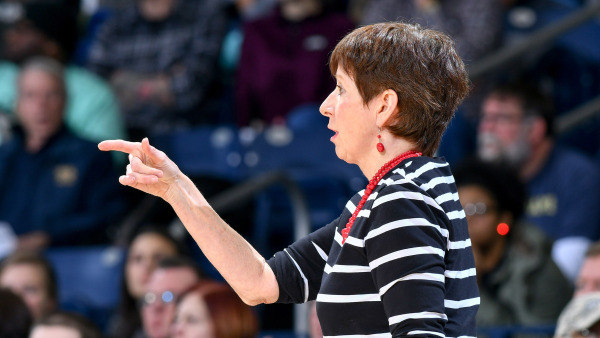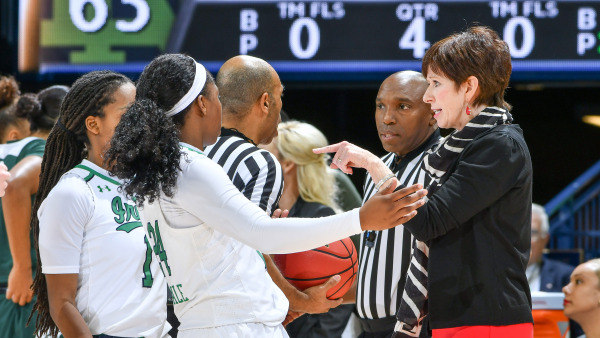Feb. 10, 2018
By John Heisler
It was awfully quiet in the locker room.
Irish veteran Kristina Nelson recalls the general thought: “How did that just happen? There was definitely a shock factor.”
It was just as silent on the flight home.
It was still quiet on the bus back to Purcell Pavilion.
And it was almost eerily quiet, long after midnight, when the University of Notre Dame women’s basketball players spilled out into the cold January night back on campus.
They had no one to commiserate with but themselves, since spring semester classes did not start for another few days.
That’s what happens when a program that’s not used to losing much, period, drops a 33-point game on the road at third-ranked Louisville.
It didn’t make the game notes, but the Irish had not lost a game by that margin in 24 years.
And yet the response by Muffet McGraw’s team to that one-sided defeat has been remarkable by almost every measure.
Maybe the Irish should have seen the Louisville experience coming following previous recent home wins by single digits against DePaul, Marquette (in overtime) and Miami that all probably qualified for the closer-than-expected column.
“I thought maybe this was about to happen,” says McGraw, “because we were headed in that direction. We weren’t playing hard enough, we weren’t buying into the defense. We thought we’d just outscore people.”
And maybe the Irish Hall of Fame coach and her squad will look back on that frustrating evening in Louisville-as well as the comeback home win against sixth-rated Tennessee exactly a week later-as turning points in a crazy season that has seen multiple season-ending knee injuries and multiple 30-plus-point decisions (one win, one loss) against top-10 opponents.

Nelson, a fifth-year forward, ranks as the old-timer among the Notre Dame players-and her five seasons in an Irish uniform have produced only a combined 12 losses, only two of those at Purcell Pavilion.
Five seasons of play in the Atlantic Coast Conference have involved only three league losses (all on the road) against 84 victories (including a dozen in the ACC Championships).
That track record made the differential at the Yum Center all that more striking-even with Louisville shooting .651 from the floor and outrebounding the Irish by 10.
Said Nelson, “We had a lot of close games leading up to Louisville, so a few of us maybe felt it coming. But you don’t expect it to happen in that style. It was almost the feeling you get when you lose in the NCAA Tournament-when your season is done. But yet we all knew we had a long season to go.
“When it happened, everything kind of clicked for everybody. We weren’t doing something right. And everything we weren’t doing right, we had to change and change it immediately.
“We had a meeting the next day and we went over everything that needed to change. With that game there was a lot we needed to correct.
“We knew we had to get better. We had to fix every mistake we made. And it wasn’t just one thing. It was effort, it was defense, it was turnovers.
“It was bad.”
And yet Notre Dame’s response has maybe been even more astounding:
–Three days later the Irish thumped Boston College by 29 points, leading 72-33 after three periods.
“We couldn’t wait to play again,” says McGraw.
–For about 13 minutes, the home matchup with Tennessee looked like a continuation of the Louisville tilt, as the Lady Vols built a 23-point first-half lead. Notre Dame ended up winning 84-70 after outscoring the visitors 34-10 in the fourth period and connecting on 23 of 38 second-half shots. Arike Ogunbowale seemed to spend the entire second half driving headlong to the basket for layups. If the game had lasted another period the Irish might well have won by 30-that’s how far the momentum had swung. It marked the greatest comeback in Notre Dame women’s basketball history.
Adds McGraw, “When we got down again against Tennessee and battled all the way back, that second half was really the turning point.”
–Notre Dame pasted Clemson by 53 points (its widest margin in an ACC game), limiting the Tigers to three fourth-period points and .259 field-goal shooting overall.
–The Irish went on the road and defeated Pittsburgh by 34, as the Panthers shot .323 from the floor.
–Notre Dame continued to travel–this time to Tallahassee to face an eighth-rated Florida State team that had lost only twice-and the result was almost identical (in the other direction) to what happened at Louisville. Notre Dame won 100-69, led by 19 at halftime and held the Seminoles to 10-of-39 shooting in the first two periods. Never had the Irish scored that many points against a top-10 opponent.
–McGraw’s crew walloped North Carolina 94-62, building a 30-point halftime advantage.
–The Irish pulled away late on the road to defeat 19th-ranked Duke by 18.
That’s seven combined wins by an average of 30.1 points per game-nearly the final margin in Louisville.
As painful as it was that night, maybe the Irish will look back on that one-sided defeat as something that jumpstarted Notre Dame to something special.
Said McGraw, “It was a definitely a soul-searching moment. It was a chance to learn, to see what we did wrong. It was the first time in a long time that we just did not compete.
“A lot of it was a culmination of events. We’d taken a lot of punches (in part due to seven consecutive road games from Nov. 14-Dec. 3) and that night we stayed down, we didn’t get back up. We felt sorry for ourselves that day and the wheels fell off.

“It was hard because you can’t control effort. We knew we were bad defensively.
“We watched the film the next day and there were just so many things we did wrong. We watched the first three periods. I couldn’t bear the fourth quarter. It was definitely rock bottom. But it was within our control. That was the good news.
“We had a team meeting and everybody could say what they were feeling. As far as the players, it was a little bit of, ‘What do you need from me? What do I have to do?’ We just talked. It was good. Someone said, ‘We need more energy, and I can bring the energy.’ It was a lot of intangibles–it wasn’t just one thing.
“But the easy thing is to pick on somebody else and say, ‘Well, if you would have done this we would have won.’ We’ve done a good job of not pointing fingers and just looking in the mirror and saying, ‘This is what I can do better.'”
And so the Irish soldier on.
With Brianna Turner, Mikayla Vaughn, Mychal Johnson and Lili Thompson all sidelined by knee injuries (not to mention Jackie Young’s broken nose and Kathryn Westbeld’s black eye), Notre Dame is down to seven healthy scholarship players.
That has prompted more zone defense, partly in an effort to avoid fouls.
“The zone has been good for us,” says McGraw. “We were forced to play it and we’ve gotten good at it. That’s been the silver lining. And we’ve done a good job of not fouling.” Absent a true point guard, the Irish have played both Marina Mabrey and Young in that role-even if being the primary ball-handler doesn’t qualify as their strength.
And most of the time Notre Dame is playing a bigger lineup than usual, creating some different matchups to consider.
The end result is a number-five national ranking for a team with five regular-season games remaining.
The Irish are one of the best-shooting teams in the country, ranking third nationally in that category (.496), and McGraw’s crew can score with anybody. Notre Dame ranks fourth at 84.8 points per game-and only the 2013-14 Irish team has been better than that at 86.1.
The Irish also rank fifth in fewest personal fouls per game (12.7) and ninth in scoring margin (18.2) and assists per game (19.1).
All that has come against a 2017-18 schedule the NCAA rates as the most difficult in the country (Irish opponents are playing at a .675 clip).
And McGraw isn’t satisfied:
“We can get a lot better. We can be more aware out there, the basketball IQ part.
“It’s the consistency of being in the right spot and making the right decisions. I know we can get better at that.”
But McGraw appreciates the general manner in which her team has dealt with maybe more than its share of adversity.
“Every now and then I go, ‘Wow. Their mental toughness and resilience has been amazing.’
“We just never stopped to talk about it,” she says.
“Our goals are the same. We’re 22-2. We can’t complain too much. And nobody is feeling sorry for us.
“So we keep moving on.”







